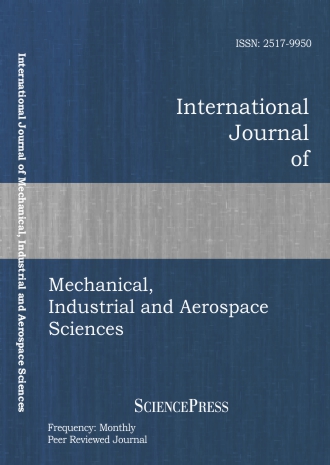
Scholarly
Volume:6, Issue: 7, 2012 Page No: 1334 - 1336
International Journal of Mechanical, Industrial and Aerospace Sciences
ISSN: 2517-9950
2492 Downloads
Nanopaper Innovation in Paper and Packaging Industry
Nowadays due to globalization of economy and competition environment, innovation and technology plays key role at creation of wealth and economic growth of countries. In fact prompt growth of practical and technologic knowledge may results in social benefits for countries when changes into effective innovation. Considering the importance of innovation for the development of countries, this study addresses the radical technological innovation introduced by nanopapers at different stages of producing paper including stock preparation, using authorized additives, fillers and pigments, using retention, calender, stages of producing conductive paper, porous nanopaper and Layer by layer self-assembly. Research results show that in coming years the jungle related products will lose considerable portion of their market share, unless embracing radical innovation. Although incremental innovations can make this industry still competitive in mid-term, but to have economic growth and competitive advantage in long term, radical innovations are necessary. Radical innovations can lead to new products and materials which their applications in packaging industry can produce value added. However application of nanotechnology in this industry can be costly, it can be done in cooperation with other industries to make the maximum use of nanotechnology possible. Therefore this technology can be used in all the production process resulting in the mass production of simple and flexible papers with low cost and special properties such as facility at shape, form, easy transportation, light weight, recovery and recycle marketing abilities, and sealing. Improving the resistance of the packaging materials without reducing the performance of packaging materials enhances the quality and the value added of packaging. Improving the cellulose at nano scale can have considerable electron optical and magnetic effects leading to improvement in packaging and value added. Comparing to the specifications of thermoplastic products and ordinary papers, nanopapers show much better performance in terms of effective mechanical indexes such as the modulus of elasticity, tensile strength, and strain-stress. In densities lower than 640 kgm -3, due to the network structure of nanofibers and the balanced and randomized distribution of NFC in flat space, these specifications will even improve more. For nanopapers, strains are 1,4Gpa, 84Mpa and 17%, 13,3 Gpa, 214Mpa and 10% respectively. In layer by layer self assembly method (LbL) the tensile strength of nanopaper with Tio3 particles and Sio2 and halloysite clay nanotube are 30,4 ±7.6Nm/g and 13,6 ±0.8Nm/g and 14±0.3,3Nm/g respectively that fall within acceptable range of similar samples with virgin fiber. The usage of improved brightness and porosity index in nanopapers can create more competitive advantages at packaging industry.
References:
[1] "Nanotechnology in packaging: a revolution in waiting,(Food